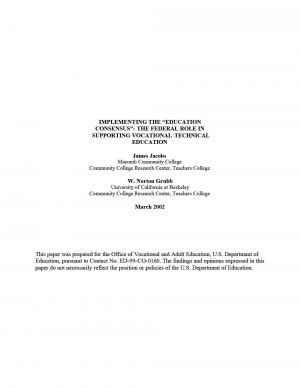
This paper examines the rationale for federal involvement in occupational education. Past discussions of this issue have come to one broad conclusion: The federal government should fund what states cannot fund on their own, including efforts to improve the quality of occupational education, and should conduct the kind of research and demonstration projects that are more efficiently carried out at the federal level.
The authors’ conclusions focus on two important changes that justify a federal role:
- The emergence of what the authors term “education consensus” on the need for a better prepared labor force for a knowledge-based society. The education consensus recognizes the need for education of a different kind, incorporating competencies that were not relevant when vocational policy was first enacted in 1917. Concomitant to that development, economic rewards have increasingly shifted to those who earn degrees.
- The continued escalation of average levels of schooling, with the consequence that high school vocational education should play a different role than it did in 1917, and that institutions that did not exist then—such as community colleges—play the dominant role in occupational preparation.
A brief of this paper, The Federal Role in Vocational-Technical Education, is available for download.
